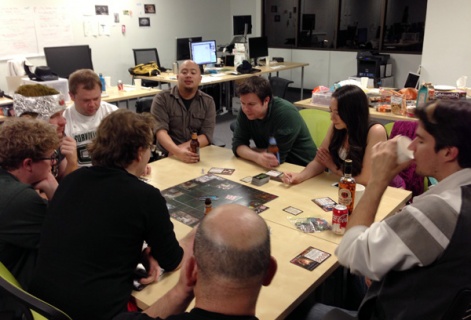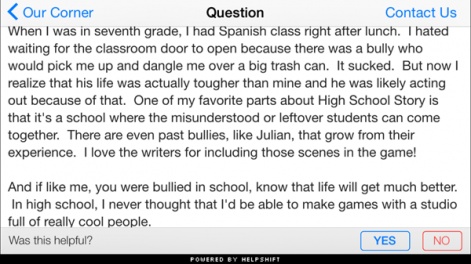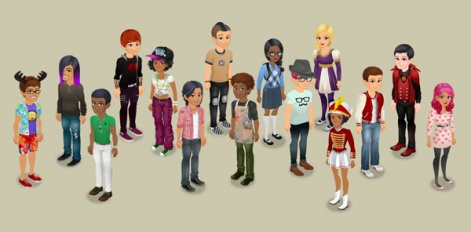PocketGamer.biz has partnered up with US developer Pixelberry Studios to highlight its candid stories on the trials and triumphs of a startup game studio whose debut title High School Story stayed in the top grossing top 100 chart for a year.
This bi-weekly series of articles will provide a mix of drama, detailed learnings, and actual numbers from their experience launching and supporting a top game.
Topics covered will include design, analytics, marketing, support, and making a difference.
Making games is a craft. It's a craft that most people begin as toddlers. But like all crafts, mastering game development takes a lot of hard work and experience.
For example, take a look at Supercell. They seemed to come out of nowhere, launching Hay Day and Clash of Clans into the top of the charts. But members of that team had first failed on Facebook, and their CEO, Ilkka Paananen, had been making mobile games before phones that supported them were even in existence.
And King.com nearly went bankrupt 8 years before launching Candy Crush Saga.
There are easier ways to make a living than creating games - ones that don't involve constant innovation, changing play patterns, and ever increasing competition. Game developers love games.
And they'll sacrifice nearly everything to make games.
The start of something beautiful
The rush of the creative process is invigorating.
That's what I did a few years after college. Like many indies, I left a promising career outside of gaming to create my own games. For my first company, my friends and I lived and worked out of a small apartment next to the railroad tracks, putting business calls on hold whenever a train passed by.
We used up all of our savings and fell into credit card debt. We slept little, beat up our bodies, deconstructed our friendships, battled stress... and had a blast.
It was worth it because we were making games.

I love making games. The camaraderie of working with a tight team towards one goal is heartwarming; the rush of the creative process is invigorating; and the thrill of seeing people enjoying the game you created - there's little else that is as rewarding.
Wanting more
But after ten years of crafting games, I almost gave it all up.
All the things I loved about making games were still there, but something had changed. I had twins. And as having kids often will trigger, I started looking at the bigger picture of my life. I saw the world from a different perspective, as the world I would be leaving to my kids. I
wanted to make that world the best place possible for them. I began wondering if I could make more of a difference by switching professions. Was I being selfish in the love I had for making games?

Educational games seemed like a natural fit. But games for young kids were already good, and I had a hard time finding educational games that teens would play outside of the classroom.
Could I continue working in games and also find a new way to make a difference?
So I looked at other fields. What Salman Khan was doing with education and the Khan Academy was inspiring. Advancements in green technologies also intrigued me.
But I still had a passion for gaming. I started to wonder if there was a way to have it all. Could I continue working in games and also find a new way to make a difference?
A solution
And then it hit. The problem with educational games for teens was that they weren't fun enough. What if instead of focusing on learning first, a team instead focused on creating a hit game first and then started layering in elements of education?
Thus began Pixelberry.
It took our new studio a year and half to launch High School Story. Even though we didn't have time to launch with any educational features, we decided to use the story of the game to help teens who felt awkward or out of place. The writers came up with a really strong story that focused on students who didn't always fit in at their old schools coming together to form their dream school.
In our in-game FAQ, I openly talked about how I was a nerd and had been bullied in school. And I passed on the message that for those being bullied in school, life would get better later.

When we launched High School Story, not a single gaming site reviewed our game. Even friends I knew in the gaming press passed on covering the game. In hindsight it made sense. Our game simply had little appeal to readers of most gaming sites.
Instead, we had designed the game to appeal to casual players. And it did. A month after launch, 2.3 million people had installed the game. We had accomplished our first step - creating a hit game.
Validation
Even without formally adding in a second step of education, we were starting to make a difference. Players told us about their experiences in App Store reviews, in-game support messages, and in blog posts.
They told us that our game gave them hope and that it was encouraging to know that our studio understood what they were going through. High School Story resonated with them.

One of my favorite messages came from a girl who had recently moved to Japan. She told us that she wasn't fitting in at her new school and was miserable. Then she played High School Story and she realized that it was okay for her to be different. Because of High School Story, she was now happy to simply be herself.
Her message and others like hers validated my decision to stay in the industry I loved.
Pixelberry had taken its first step towards crafting a game with heart and we had a lot more to do.
Next: Inspired by two girls
Oliver Miao is the CEO of Pixelberry Studios.
Through partnerships with non-profits, Pixelberry's hit game High School Story has taught millions of players about tough teen issues, like cyberbullying and eating disorders.
You can find out more at pixelberrystudios.com




















